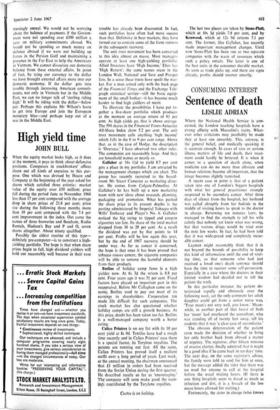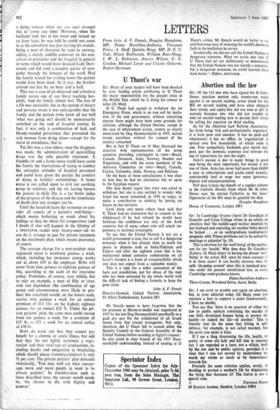Sentence of death
CONSUMING INTEREST LESLIE ADRIAN
Where the National Health Service is con- cerned, the London teaching hospitals have a strong affinity with Mussolini's trains. What- ever other criticisms may justifiably be made they at least run smoothly. This, anyway, is the general belief, and medically speaking it is accurate enough. In cases of rare or serious illness, matters of life and death, their treat- ment could hardly be bettered. It is when it comes to a question of death alone, when medicine can do no more than alleviate and human relations become all-important, that the image becomes slightly tarnished.
A recent case in point is that of a patient taken into one of London's biggest hospitals with what her general practitioner strongly suspected to be secondary cancer. After three days of silence from the hospital, her husband was called abruptly from her bedside in the middle of visiting hours to speak to the doctor in charge. Returning ten minutes later, ho managed to find the strength to tell his wife calmly that nobody yet knew what was wrong, but that various drugs would be tried over the next few weeks. In fact, he had been told that it was widespread and completely incur- able cancer.
Laymen might reasonably think that it is not beyond the- bounds of possibility to keep this kind of information until the end of visit- ing time, so that someone who had just received a loved one's death sentence should have the time to recover some self-possession. Especially in a case where the doctors in their limited wisdom had decided not to tell the patient the truth.
In this particular instance the patient de- teriorated rapidly and obviously over the following week, yet the only comment her adult daughter could get from a senior nurse was, `Your mum's not very well, you know.' Mean- while, in another part of that forest of beds her 'mum' had overheard the consultant, who was standing all of twenty feet away, tell his students that it was 'a clear case of secondaries.'
The obvious deterioration of the patient soon made the decision of whether to bring her only brother back from abroad a matter of urgency. The registrar, after fifteen minutes of evasive chatter, finally admitted that it might be a good idea if he came back in ten days' time. The next day, on the same registrar's advice, the family were told to send for him at once, but the message added the rider that there was no need for anyone to call at the hospital before the usual visiting hours. (If there is one thing hospitals seem to dread as much as infection and dirt, it is a breach of the few mean hours allowed for visiting.)
Fortunately, the sister in charge (who knows a dying woman when she sees one) changed this to 'come any time.' However, when the husband took her at her word and turned up an hour later, he was told he could not come in as the consultant was just starting his rounds. Being a man of character he went in anyway, adding a clearly audible comment on the con- sultant in particular and the hospital in general in terms which would have shocked Lady Dart- mouth and did send a naughty quiver of sym- pathy through the inmates of the ward. Had the family waited for visiting hours the patient would have been dead. As it was, the brother arrived too late by an hour and a half.
This was a case of an educated and articulate family versus one of our finest teaching hos- pitals. And the family almost lost. The loss of a life was inevitable, but in this period of misery and nervous strain it was unforgivable that the family and the patient (who knew all too well `what was going on') should be unnecessarily stretched on the rack of hospital routine. In fact, it was only a combination of luck and bloody-minded persistence that prevented the sick woman from dying alone—except for the nurse in attendance, that is.
Yet this was a case where, once the diagnosis was made, the administration of pain-killing drugs was the only possible treatment. A friendly GP and a home nurse could have saved the family the frustrations of trying to combat the antiseptic attitudes of hospital personnel and could have given the patient the comfort of dying in familiar surroundings. A home nurse is not called upon to dish out soothing syrup to relatives, and the GP, having known the patient in daily life, is a far better judge of the progress of the disease and the imminence of death than any stranger can be.
Until the hospitals have the resources to con- sider all aspects of a patient's well-being— which means bothering as much about his feelings as they do about his temperature (and I doubt if that will happen in the lifetime of a SPECTATOR reader over twenty-one)—all we can do is arrange to pay for private treatment on the instalment plan, which means insurance, of course.
The average charge for a non-resident state registered nurse is seventeen guineas a week, which, including her insurance stamp, works out at about £19 to the employer. BUPA will cover from nine guineas to eighteen guineas of this, according to the scale of the insurance policy. Premiums, of course, vary widely, but to take an example, a man of fifty or over, with one dependant (the combination of age group and circumstances most likely to pro- duce this situation) would, on the lowest scale, receive nine guineas a week for an annual premium of £13 1 ls; on the highest, eighteen guineas for an annual £32 7s. Under the pri- vate patients' plan, the same man could recoup from ten guineas a week, for a premium of £13 4s, to £21 a week for an annual outlay of £38 6s.
BUPA do point out that they cannot pay benefit for a chronic or senile illness, but add that they 'do not lightly terminate a regis- tration' and their total rate of terminations, in- cluding deaths and emigration (a bracketing which should please transmigrationists) is only 3} per cent. The private patients' plan demands rhetorically, 'You may well ask what encour- ages more and more people to want to be private patients.' In circumstances such as those described here, the answer would surely be, 'the chance to die with dignity and honesty.'



































 Previous page
Previous page